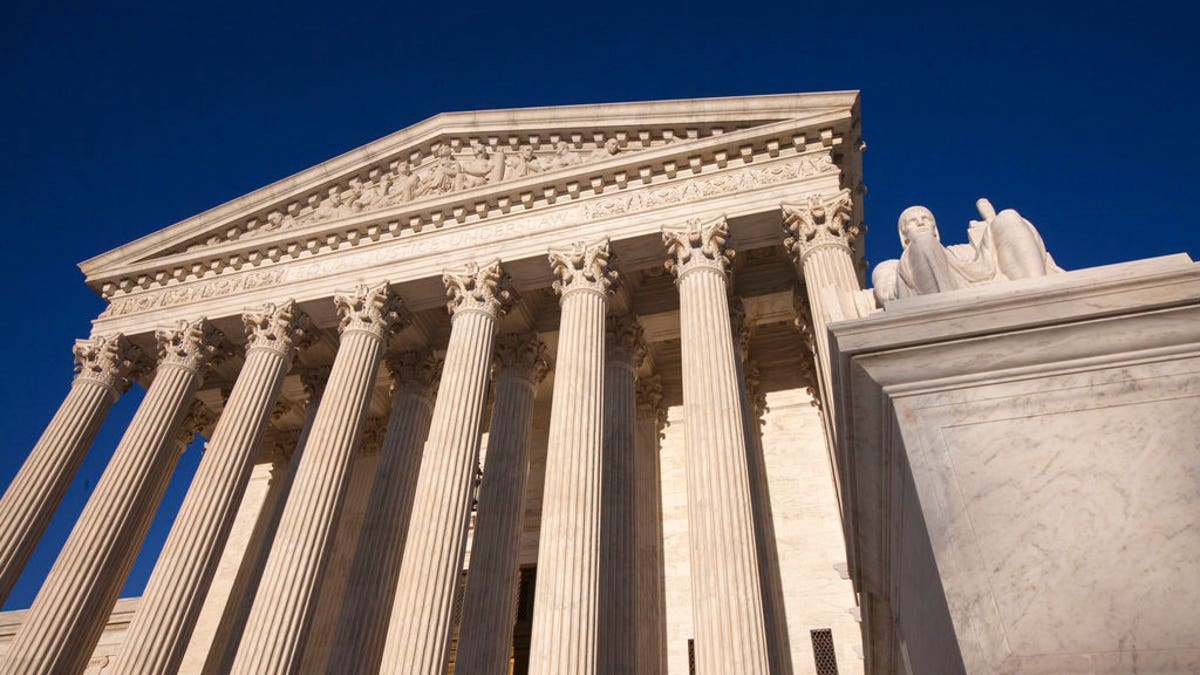
Oral arguments will be held this week at the Supreme Court on President Trump's so-called travel ban. (AP)
The 5-4 Supreme Court decision Tuesday striking down a California law requiring pro-life pregnancy support centers to advertise government-funded abortions raises two significant questions:
First, why do many evangelical Christians and Catholics care so deeply about the issues of abortion?
And second, do other Americans have reason to care about this issue deeply as well?
In its ruling, the Supreme Court overturned a California law requiring pregnancy support centers to inform women they serve about the state’s family planning services, which include providing abortions. The high court said the requirement violates the First Amendment of the Constitution because it mandates that the pregnancy support centers promote something they oppose – abortion.
We cannot buy into the view that an unborn being is its mother’s property – and that the mother therefore has the right to dispose of the property. The unborn child is a human being who deserves justice and equality just like the rest of us.
Given that most of our nation’s roughly 2,700 pregnancy support centers are Christian-based, the court’s ruling also helps secure the religious concerns of Christians who don’t want to be forced to convey messages at odds with their beliefs.
Many evangelicals and Catholics care deeply about abortion because, along with thousands of obstetricians, gynecologists, and health care organizations, we believe that the unborn being in a mother’s womb is a human person.
Unlike the Supreme Court majority in the Roe v. Wade decision in 1973 that said women have a constitutional right to choose an abortion with some restrictions, we cannot buy into the view that an unborn being is its mother’s property – and that the mother therefore has the right to dispose of the property. The unborn child is a human being who deserves justice and equality just like the rest of us.
To use specifically Christian language, we believe the Bible’s teaching that God creates unborn beings in his image, endowing them with intrinsic dignity and worth (Gen 1:26; Ps. 139:13-14); that God values unborn babies on par with adults (Ex. 21:22-25); and that he even consecrates them for service while they are still in the womb (Lk 1:41). Thus, Christians have specifically Christian reasons for protecting unborn beings in the womb.
But what about other Americans? They also have reason to care deeply about abortion. As I’ve written in Letters to an American Christian, the abortion industry is bad for society.”
The sociological rationale against abortion is outlined nowhere better than “The America We Seek: A Statement of Pro-Life Principle and Concern,” (TAWS) a multi-authored document – produced by experts in law, psychology, medicine, and philosophy – enumerating 26 ways abortion harms our society.
It is recognized, first of all, that abortion hurts the unborn baby. Modern science demonstrates with clarity that the baby feels pain.
As the authors of TAWS recently wrote: “The unborn child in America today enjoys less legal protection than an endangered species of bird in a national forest.” This is profoundly wrong, and we should neither weary nor rest until every unborn child is protected by law and welcomed in life.
America’s abortion laws also hurt men, women and families by encouraging male irresponsibility and predatory sexual behavior and by signaling that it is morally acceptable for families to solve their problems by employing lethal violence.
This normalization of lethal violence, in turn, erodes our nation’s moral foundations and numbs our collective conscience. As Harvard Law Professor Mary Ann Glendon wrote about Roe v. Wade: “There is growing awareness that the moral ecology of the country has suffered something like an environmental disaster, and that we are faced with a very complicated cleanup operation.”
Abortion further harms society by minimizing our nation’s mediating institutions.
Abortion-on-demand assumes that an individual – the mother – has the right to take her baby’s life without the consent even of the father or the baby’s siblings. Thus, our nation lurches even further toward a situation in which the only actors of consequence are the overweening state and the isolated individual.
Finally, the legalization of abortion also undermines justice and equality and thus our claim to be a law-governed democracy.
Lethal violence against an innocent unborn being should not be a matter of choice any more than lethal violence against newborn babies, adolescents, or elderly people. In fact, how we treat the most vulnerable among us reveals what our values really are and what kind of nation we aspire to be.
So we should be thankful for the Supreme Court’s ruling Tuesday in the case of National Institute of Family and Life Advocates (NIFLA) v. Becerra.
By protecting our freedom of speech, the Supreme Court decision allows us to continue to voice our desire for a society in which every unborn child is protected by law and welcomed in life.
The high court’s ruling allows us to back up our words with actions, such as supporting foster homes, facilitating adoptions, ministering to single mothers, and helping provide greater access to health care for financially distressed families.
More than anything, however, free speech protections ultimately allow us to speak to these issues in a way that reflects the Gospel of Christ.
For abortive mothers, the Gospel heals and reminds that another child, a son, died to liberate her from residual guilt.
For fathers who may have approved of, paid for, or pressured women to have an abortion, the Gospel points them to another father whose own child, a son, was killed and who offers forgiveness.
And for doctors whose hands have been employed in abortive procedures, the Gospel speaks of the great physician who offers eternal life for those who have caused temporal death.
